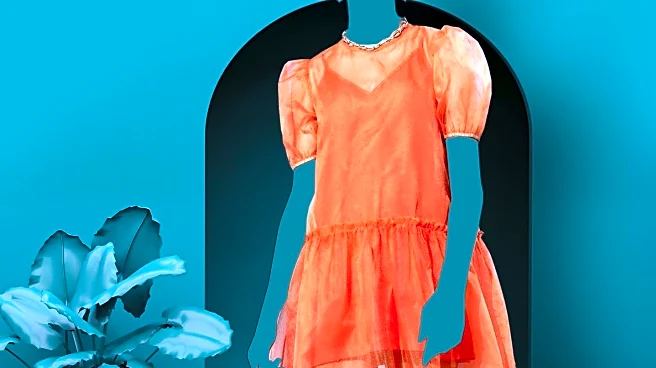What's Happening?
Alexia Ulibarri presented her Mexico Spring 2026 collection, drawing inspiration from the medieval Spanish novel 'La Celestina'. The collection explores themes of feminine intuition and ancestral wisdom,
featuring designs that include T-shirts with the word 'bruja', voluminous tulle skirts, and reimagined corsetry. Ulibarri's designs emphasize the magical nature of the female body, opting for garments that do not compress but rather accentuate natural forms. The collection also incorporates masks that merge with the garments, symbolizing duality and the idea of being in multiple places at once. The color palette includes sky blue, black, and fuchsia pink, reflecting Mexican cultural influences.
Why It's Important?
Ulibarri's collection highlights the growing trend in fashion to embrace cultural heritage and feminine empowerment. By focusing on themes of intuition and ancestral wisdom, the collection resonates with broader societal movements advocating for women's rights and cultural appreciation. The use of traditional Mexican colors and motifs underscores the importance of cultural identity in contemporary fashion. This approach not only appeals to consumers seeking authenticity but also supports the narrative of fashion as a medium for cultural expression and empowerment.
What's Next?
Ulibarri's collection may influence other designers to explore cultural and feminine themes in their work, potentially leading to a broader trend in the fashion industry. As the collection gains attention, it could inspire collaborations with artists and cultural institutions, further integrating fashion with cultural storytelling. The emphasis on non-compressive designs might also encourage a shift towards more body-positive fashion, impacting industry standards and consumer expectations.
Beyond the Headlines
The collection's focus on feminine intuition and ancestral wisdom raises questions about the role of fashion in cultural preservation and the empowerment of women. By celebrating the magical aspects of the female form, Ulibarri's work challenges traditional fashion norms and promotes a more inclusive and diverse representation of beauty. This could lead to discussions on the ethical responsibilities of designers in shaping societal perceptions and the importance of supporting female-led enterprises in the fashion industry.











